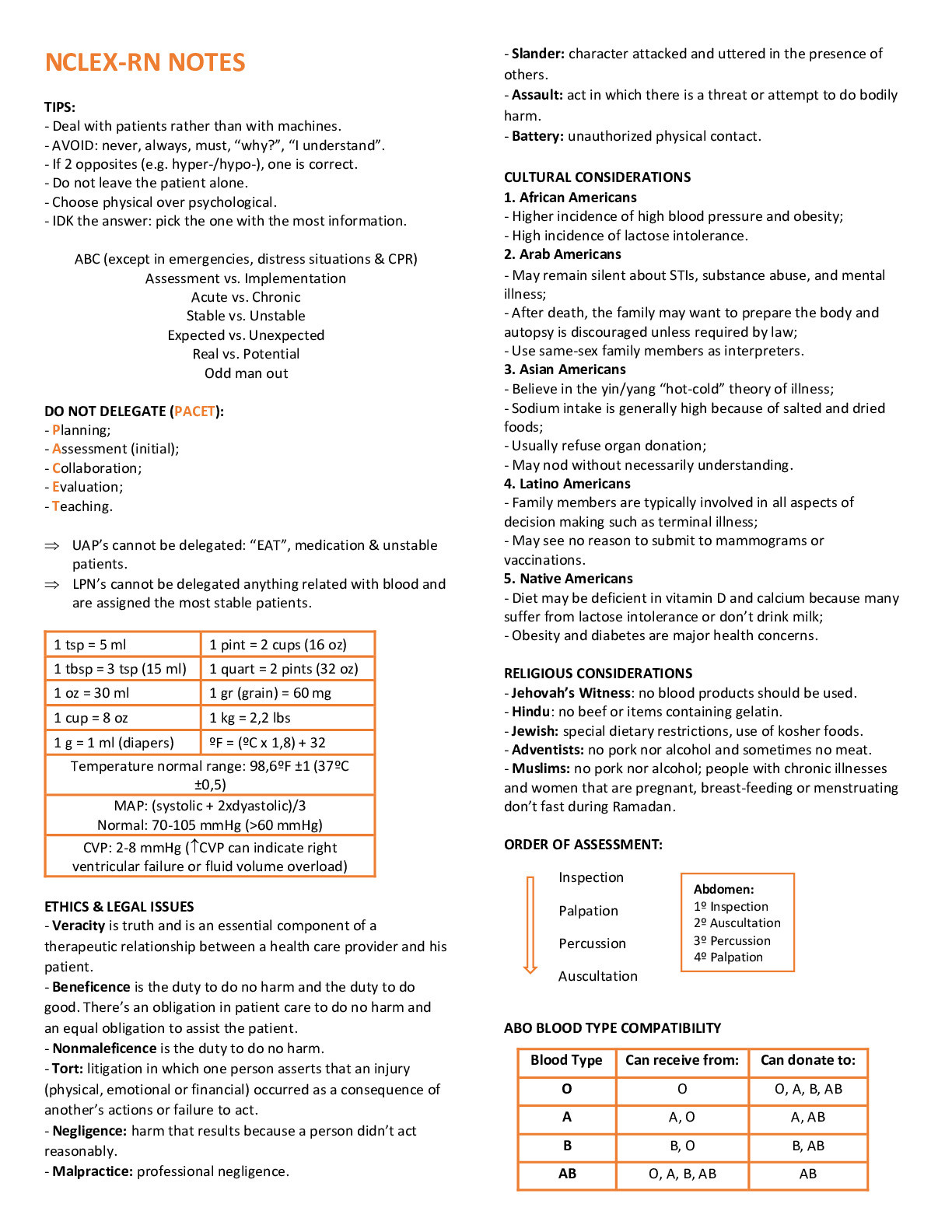All study resources > NCLEX-RN Cheat Sheet (Claudia Goncalves) (Nursing)
NCLEX-RN Cheat Sheet (Claudia Goncalves)
NCLEX-RN NOTES
TIPS:
- Deal with patients rather than with machines.
- AVOID: never, always, must, “why?”, “I understand”.
- If 2 opposites (e.g. hyper-/hypo-), one is correct.
- Do not leave the patient alone.
- Choose physical over psychological.
- IDK the answer: pick the one with the most information.
ABC (except in emergencies, distress situations & CPR)
Assessment vs. Implem
...[Show More]
NCLEX-RN NOTES
TIPS:
- Deal with patients rather than with machines.
- AVOID: never, always, must, “why?”, “I understand”.
- If 2 opposites (e.g. hyper-/hypo-), one is correct.
- Do not leave the patient alone.
- Choose physical over psychological.
- IDK the answer: pick the one with the most information.
ABC (except in emergencies, distress situations & CPR)
Assessment vs. Implementation
Acute vs. Chronic
Stable vs. Unstable
Expected vs. Unexpected
Real vs. Potential
Odd man out
DO NOT DELEGATE (PACET):
- Planning;
- Assessment (initial);
- Collaboration;
- Evaluation;
- Teaching.
UAP’s cannot be delegated: “EAT”, medication & unstable patients.
LPN’s cannot be delegated anything related with blood and are assigned the most stable patients.
1 tsp = 5 ml
1 pint = 2 cups (16 oz)
1 tbsp = 3 tsp (15 ml)
1 quart = 2 pints (32 oz)
1 oz = 30 ml
1 gr (grain) = 60 mg
1 cup = 8 oz
1 kg = 2,2 lbs
1 g = 1 ml (diapers)
ºF = (ºC x 1,8) + 32
Temperature normal range: 98,6ºF ±1 (37ºC ±0,5)
MAP: (systolic + 2xdyastolic)/3
Normal: 70-105 mmHg (>60 mmHg)
CVP: 2-8 mmHg (CVP can indicate right ventricular failure or fluid volume overload)
ETHICS & LEGAL ISSUES
- Veracity is truth and is an essential component of a therapeutic relationship between a health care provider and his patient.
- Beneficence is the duty to do no harm and the duty to do good. There’s an obligation in patient care to do no harm and an equal obligation to assist the patient.
- Nonmaleficence is the duty to do no harm.
- Tort: litigation in which one person asserts that an injury (physical, emotional or financial) occurred as a consequence of another’s actions or failure to act.
- Negligence: harm that results because a person didn’t act reasonably.
- Malpractice: professional negligence.
- Slander: character attacked and uttered in the presence of others.
- Assault: act in which there is a threat or attempt to do bodily harm.
- Battery: unauthorized physical contact.
CULTURAL CONSIDERATIONS
1. African Americans
- Higher incidence of high blood pressure and obesity;
- High incidence of lactose intolerance.
2. Arab Americans
- May remain silent about STIs, substance abuse, and mental illness;
- After death, the family may want to prepare the body and autopsy is discouraged unless required by law;
- Use same-sex family members as interpreters.
3. Asian Americans
- Believe in the yin/yang “hot-cold” theory of illness;
- Sodium intake is generally high because of salted and dried foods;
- Usually refuse organ donation;
- May nod without necessarily understanding.
4. Latino Americans
- Family
[Show Less]
